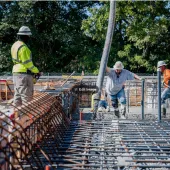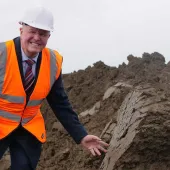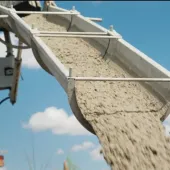BSI launches new lower-carbon concrete guidance
The British Standards Institution (BSI) has released new guidance to support the UK construction industry in reducing the carbon footprint of concrete production.
The Lower Carbon Concrete – Alternative Binder Systems – Code of Practice (BSI Flex 350 Version 2) focuses on sustainable concrete alternatives and provides a framework for assessing and using Alternative Binder Systems (ABS) in construction.
ABS, such as geopolymers and alkali-activated materials (AAM), offer significantly lower emissions compared to traditional Portland cement, which currently dominates the industry. In the UK alone, 11.7 million metric tonnes of Portland cement are used annually, contributing nearly 90% of the CO2 emissions associated with concrete production, according to the European Ready Mixed Concrete Organisation and the ICE Low Carbon Concrete Routemap.
The new BSI guidance offers engineers and designers practical advice on incorporating these lower-carbon alternatives into their projects. It includes detailed recommendations, explanations, and suggestions on how to evaluate and specify ABS concretes. These alternatives not only help to reduce greenhouse gas emissions but also maintain the durability and strength that concrete construction requires.
Although the guidance is tailored to the UK market, it can also serve as a reference for international applications where sustainable construction practices are becoming more critical.
Clare Price, BSI’s sector lead for the built environment, said: “The built environment has a huge role to play in supporting the transition to net zero. This guidance is designed to empower engineers to make more sustainable choices in order to reduce carbon emissions in construction projects, while giving all involved the confidence in the suitability of chosen materials.”
The document provides insight into the technical aspects of using alternative binders, such as assessing their environmental impact and ensuring they meet structural requirements. By offering a structured approach, BSI hopes to encourage wider adoption of low-carbon technologies in the construction sector, helping to reduce the industry's overall carbon emissions and move towards net zero targets.
For more information on BSI Flex 350 Version 2, visit bsigroup.com







